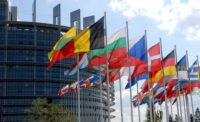One of the interesting results of the digital age is the proliferation of “franken-documents.” This is documentation created by combining together bits and pieces of other people’s documents.
The creation of documents based on the work of others has become commonplace in many companies. The practice of borrowing and reusing content is even expected in some organizations. Benchmarking others is seen as a best practice and the use of templates is viewed as cost-effective.
The ethical issue
The interesting question from an ethics perspective is when does the use of other people’s documents because unethical. Most professionals agree that plagiarism, the copying of someone else’s work and passing it off as your own, is unethical. It is also a violation of most professional codes of ethics, including that of the American Board of Industrial Hygiene (ABIH). Depending on the circumstances, using other people’s content can also be a copyright violation or the breach of a confidentiality agreement.
It is important to learn from the experiences of others. This is the skill that has made humans successful as a species. The desire to learn from others is what makes finding materials on the internet so appealing. This includes both model documents we can benchmark and the ubiquitous fill-in-the-blank templates, checklists and forms that are available for every topic from risk assessment to auditing. As the sales copy on one website put it: “Why start with a blank page when you can leverage industry best practices…save time and money in the design and implementation of new processes.”
Using templates
Most people love templates. Templates can make our job easier by creating a framework for organizing our thoughts into coherent and useful documents. I am an avid user of PowerPoint templates in developing training programs. I also rely on a variety of standardized checklists and forms that I have developed and refined over the years to help my clients implement effective management systems processes.
Benchmarking can be a valuable exercise. I help organizations benchmark their management system processes against the requirements and guidelines set out in a variety of consensus standards. I work with companies in developing templates, protocols and forms to help them streamline their internal audit programs.
Dubious documentation
There are, however, several pitfalls associated with the use of templates and benchmarking in document creation. These include:
Copying Others Can Create a False Sense of Security – We are most often tempted to copy documentation when we lack familiarity about a topic. There is often a sense of security associated with using a template, program, procedure or form that appears to be from a reliable source or a similar company.
Unfortunately, this may be a false sense of security.
First, the person who created the documentation may not be an expert and could be even less familiar with the topic than you are. More importantly, the documentation was created for an organization that is different than yours – with a different structure, objectives, culture and legal requirements. Processes that are appropriate for one organization may not be appropriate another.
Copying Others Stifles Creativity – When we are copying others, we are not exploring creative solutions to our own unique problems. Although there are situations where it is important to follow what everyone else is doing, that is not always the case. Being creative means putting in the time to fully understand a topic and how it applies to your situation. It often means starting with a blank piece of paper – not simply revising a document that was created to meet someone else’s needs.
Copying Others Can Be Expensive – When standardized documentation is created for use by many different organizations, it may not be appropriate for your specific organization. To avoid potential liability, templates are often written so they address every possible legal requirement that could be applicable to any organization in any jurisdiction. This means you could be spending resources to conform to requirements that are not actually applicable to your company.
Copying Others Can Create Potential Legal Liability – If the document being copied is confidential or copyrighted, there can be legal risks associated with its use.
Like everyone else, I surf the internet looking for ideas that will improve my professional practice. What I try to keep in mind is that simply copying the work of others is often not the panacea it may appear to be. Creating franken-documents may be easy but creating original content is often more rewarding – and less risky.


